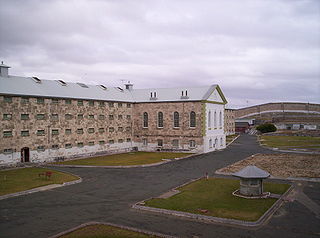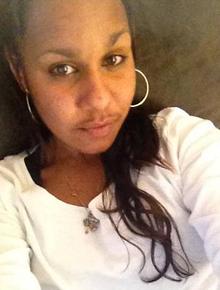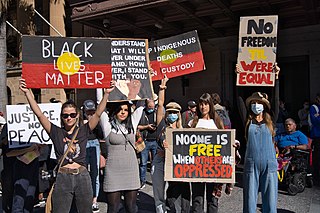Related Research Articles

A coroner is a government or judicial official who is empowered to conduct or order an inquest into the manner or cause of death. The official may also investigate or confirm the identity of an unknown person who has been found dead within the coroner's jurisdiction.

The Long Bay Correctional Complex, commonly called Long Bay, is a correctional facility comprising a heritage-listed maximum and minimum security prison for males and females and a hospital to treat prisoners, psychiatric cases and remandees, located in Malabar, Sydney, New South Wales, Australia. The complex is located approximately 14 kilometres (8.7 mi) south of the Sydney CBD and is contained within a 32-hectare (79-acre) site. The facility is operated by Corrective Services New South Wales, a department administered by the Government of New South Wales.

The former Grafton Gaol, later called the Grafton Correctional Centre and then Grafton Intake and Transient Centre is a heritage-listed former medium security prison for males and females, located in Grafton, Clarence Valley Council, New South Wales, Australia. The centre was operated by Corrective Services NSW an agency of the Department of Attorney General and Justice of the Government of New South Wales. In its last correctional use, the centre detained sentenced and remand prisoners under New South Wales and/or Commonwealth legislation. It was added to the New South Wales State Heritage Register on 2 April 1999.
Francis Greenway Correctional Complex, formerly John Morony Correctional Complex is an Australian minimum security prison complex for males and females located in Berkshire Park, 5 kilometres (3 mi) south of Windsor in New South Wales, Australia. The complex is operated by Corrective Services NSW, an agency of the Department of Communities and Justice, of the Government of New South Wales.

Aboriginal deaths in custody is a political and social issue in Australia. It rose in prominence in the early 1980s, with Aboriginal activists campaigning following the death of 16-year-old John Peter Pat in 1983. Subsequent deaths in custody, considered suspicious by families of the deceased, culminated in the 1987 Royal Commission into Aboriginal Deaths in Custody (RCIADIC).
The 2004 Palm Island death in custody incident relates to the death of an Aboriginal resident of Palm Island, Cameron Doomadgee on Friday, 19 November 2004 in a police cell. The death of Mulrunji led to civic disturbances on the island and a legal, political and media sensation that continued for fourteen years.

The Coroners Court of Queensland is a court in the court hierarchy of Queensland, Australia. The Court has exclusive jurisdiction in Queensland over the remains of a person and to make findings about the cause of death of a person.
The title of Coroners Court is the name given to proceedings in which a coroner holds an inquest or an inquiry in the Northern Territory.
Deaths in custody, including police and prison custody, are subject to significant concern for a number of reasons, including the intrinsically vulnerable nature of some of those in custody, and the power imbalance inherent in the situation. Deaths in custody in England and Wales are looked at by inquests, and when it is possible that the state failed to protect the deceased's life are scrutinised using the 'right to life'.

Punishment in Australia arises when an individual has been accused or convicted of breaking the law through the Australian criminal justice system. Australia uses prisons, as well as community corrections. When awaiting trial, prisoners may be kept in specialised remand centres or within other prisons.
Scot Young was a Scottish property developer, who came to media attention during a protracted and bitter divorce case brought by his former wife Michelle. He claimed to have lost all his assets in a bad property deal, but his ex-wife claimed he was worth “billions” and that the family court should force Scot to pay her several hundred million pounds.

Julieka Ivanna Dhu was a 22-year-old Aboriginal Australian woman who died in police custody in South Hedland, Western Australia, in 2014. On 2 August that year, police responded to a report that Dhu's partner had violated an apprehended violence order. Upon arriving at their address, the officers arrested both Dhu and her partner after realising there was also an outstanding arrest warrant for unpaid fines against Dhu. She was detained in police custody in South Hedland and was ordered to serve four days in custody in default of her debt.
Inquest Charitable Trust is a charity concerned with state related deaths in England and Wales. It was founded in 1981. Inquest provides support on state-related deaths, including deaths in custody and their investigation, to bereaved people, lawyers, advice and support agencies, the media and parliamentarians.

Rosalinda "Ros" Fogliani is Western Australia’s first female State Coroner.

"I can't breathe" is a slogan associated with the Black Lives Matter movement in the United States. The phrase originates from the last words of Eric Garner, an unarmed man who was killed in 2014 after being put in a chokehold by a New York City Police Officer. A number of other Black Americans, such as Javier Ambler, Manuel Ellis, Elijah McClain, and George Floyd, have said the same phrase prior to dying during similar law-enforcement encounters. According to a 2020 report by The New York Times, the phrase has been used by over 70 people who died in police custody.

Shortly after protests began in the United States in late May 2020 seeking justice for George Floyd, an African-American who was murdered during an arrest by Minneapolis police, people in Australia protested to show solidarity with Americans and the Black Lives Matter movement, as well as to demonstrate against issues with police brutality and institutional racism, racism in Australia, and Aboriginal deaths in custody. Vigils and protests of thousands of participants took place nationwide.

Olaseni Lewis, a 23-year-old British man, died on 3 September 2010 at Bethlem Royal Hospital in London, United Kingdom, after police subjected him to prolonged physical restraint. Lewis had voluntarily sought care following the onset of acute mental health issues and died from cerebral hypoxia soon after, following actions that involved eleven officers of London's Metropolitan Police. After seven years of campaigning by Lewis' family and two inquiries by the Independent Police Complaints Commission (IPCC), a second coroners' inquiry was raised.
Simone Monika Strobel was a 25-year-old German kindergarten teacher and backpacker whose body was found at a sportsground in Lismore, New South Wales, six days after being reported missing from the caravan park where she had been staying. An initial inquest in 2007 found insufficient evidence to lay charges over her death.
Shandee Blackburn was a 23 year old woman who was murdered in Mackay, Queensland, Australia in February 2013. Blackburn's ex-boyfriend, John Peros, was initially charged with her murder, but was then acquitted in 2017 at trial. A 2019 coronial inquest, however, later identified Peros as the main suspect. A podcast by The Australian's Hedley Thomas was released in late 2021 which detailed the entirety of the case and issues concerning the investigation. As a result of the renewed interest created, the coronial inquest was reopened in February 2022.
Charles Arnold Walker, for cultural reasons known as Kumanjayi Walker since his death, was a Warlpiri man who was shot and killed by police while resisting arrest in the remote Aboriginal Australian community of Yuendumu, Northern Territory, in November 2019. Walker stabbed Constable Zachary Rolfe with a pair of scissors. Rolfe subsequently fatally shot him and was charged with murder three days later, but was acquitted in March 2022. Thousands of people rallied in Alice Springs in the days following the attempted arrest, and further protests followed in capital cities around Australia. After the acquittal of Rolfe a campaign entitled "Justice for Walker" has continued.
References
- 1 2 Anabel, Anita (4 June 2020). "David Dungay Junior — Memorise His Name and Learn His Story". The Latch. Retrieved 12 June 2022.
- 1 2 3 4 5 6 "Inquest into the death of David Dungay" (PDF). Coroner's Court of New South Wales. 22 November 2019. Retrieved 28 December 2021.
- 1 2 3 Fuller, Taylor; Herbert, Miles; Davidson, Helen (11 April 2018). "'If you can talk, you can breathe': the death in custody of David Dungay". The Guardian. ISSN 0261-3077 . Retrieved 15 June 2020.
- 1 2 3 Earl, Carly (13 July 2018). "David Dungay Jr dies in custody, and his family are changed forever – photo essay". The Guardian. ISSN 0261-3077 . Retrieved 15 June 2020.
- 1 2 Williams, Carly (10 June 2021). "David Dungay Jr's mother takes fight against Indigenous deaths in custody to United Nations". ABC News. Australian Broadcasting Corporation . Retrieved 2 November 2021.
- ↑ Dungay v R; R v Dungay [2010] NSWCCA 82 (13 May 2010), Court of Criminal Appeal (NSW,Australia)
- ↑ "The story of David Dungay and an Indigenous death in custody". The Guardian . 11 June 2020. Retrieved 15 June 2020.
- ↑ Hayman-Reber, Madeline (9 September 2016). "Long Bay rally planned for David Dungay". NITV . Retrieved 2 November 2021.
- 1 2 "Like George Floyd, this man's uncle died saying 'I can't breathe'. His family want Australians to be outraged". ABC News. Australian Broadcasting Corporation. 1 June 2020. Retrieved 15 June 2020.
- ↑ "Inquest Findings into the Death of David Dungay" (PDF). Coroner's Court of NSW. p. 13. Retrieved 18 January 2022.
- ↑ "David Dungay coronial inquest to begin after family's long wait for justice". The Guardian . 15 July 2018. Retrieved 15 June 2020.
- ↑ "Inquest Findings into the Death of David Dungay" (PDF). Coroner's Court of NSW. p. 14. Retrieved 18 January 2022.
- ↑ Davidson, Helen (15 July 2018). "David Dungay coronial inquest to begin after family's long wait for justice". The Guardian . ISSN 0261-3077 . Retrieved 15 June 2020.
- ↑ Davidson, Helen (16 July 2018). "David Dungay inquest: shocking video shows prison officers restraining inmate before death". The Guardian. ISSN 0261-3077 . Retrieved 15 June 2020.
- 1 2 Allam, Lorena (22 November 2019). "David Dungay inquest: guards who restrained Indigenous man before his death won't be disciplined". The Guardian . ISSN 0261-3077 . Retrieved 15 June 2020.
- ↑ Allam, Lorena (10 June 2021). "United Nations asked to look into the death in custody Indigenous man David Dungay". The Guardian. Retrieved 28 December 2021.
- ↑ "Deaths in custody: Australian mother takes fight to UN". BBC News . 10 June 2021. Retrieved 28 December 2021.